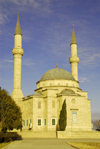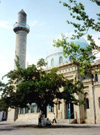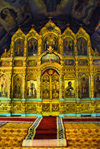 Ajdarbey
Mosque: S. Vurgun 100
Ajdarbey
Mosque: S. Vurgun 100| Places of Worship in Baku |
Azerb.com
|
The Azeri constitution,
mandating no state religion, allows for all faiths to practice their religion
freely. Following independence there has been both a Muslim revival and
a rise in nationalism. Many religious buildings in Azerbaijan were destroyed
during the Soviet era, including the Russian Orthodox Alexander Nevsky
Cathedral and the Muslim Bibi Heybat Mosque, which was rebuilt in 1998.
See religion.
| Mosques |
 Like
in Iran, the majority of Azeris are Shia Muslims (Jafarite rite), whereas
Sunni Muslims make up most of the Islamic population of the rest of the
former Soviet Union.
Like
in Iran, the majority of Azeris are Shia Muslims (Jafarite rite), whereas
Sunni Muslims make up most of the Islamic population of the rest of the
former Soviet Union.
Sunni Islam, the more secular branch, practices leadership by consensus, whereas Shia leadership derives its authority by divine right. In a spirit of tolerance.
Most mosques in Baku serve both the Shia
and the Sunni communities.
 Ajdarbey
Mosque: S. Vurgun 100
Ajdarbey
Mosque: S. Vurgun 100| Churches |
 The
Christian community is made mainly of Russian Orthodox, with smaller groups
of Catholics and Protestants. Some Evangelical churches have been very
active after independence.
The
Christian community is made mainly of Russian Orthodox, with smaller groups
of Catholics and Protestants. Some Evangelical churches have been very
active after independence.
The main Russian Orthodox church is the Holy Myrrhbearers Cathedral, erected in 1909, closed in 1920 and re-opened in 2000. Baku's old Alexander Nevsky Cathedral was demolished by Stalin in 1936 making the Church of Archangel Michael the oldest Orthodox temple in the city.
The formerly important Armenian community is now completely gone, the church still exists but is closed. Armenian churches all over Azerbaijan have been abandoned or used for other purposes.
A Catholic church was completed
in Nobel avenue in the spring of 2007 and immediately suffered an arson
attack (a Christian graveyard of Yasamal district was also burned in 2007)..
Baku's previous Roman Catholic church was destroyed by the Soviet government
in 1931 (Church of the Immaculate Conception of the Blessed Virgin Mary).
|
| Synagogues |
 At
present the Jewish population lives mostly in the capital (10.000) with
important concentrations in Krasnaya Sloboda
(3500), Oguz (800) and Privolnoe and several
small groups in other towns. The community is composed of Ashkenazi (4000),
Georgian (1000) and Mountain Jews, Jewish Tats (11.000).
At
present the Jewish population lives mostly in the capital (10.000) with
important concentrations in Krasnaya Sloboda
(3500), Oguz (800) and Privolnoe and several
small groups in other towns. The community is composed of Ashkenazi (4000),
Georgian (1000) and Mountain Jews, Jewish Tats (11.000).
The Ashkenazi arrived mainly in the 19th century. The Ashkenazi Jews of Privolnoe are Gerim and Sobbotnik Jews, the former descendants of Russian converts to Judaism and the latter Karaite Jews who adhere to the Bible, but not to the oral halakhic tradition. Tat Jews trace their roots back many centuries and speak a Indo-European Language called Tati (Judeo-Tat dialect). The Tats moved to Baku from a mountain way of life and have become extremely assimilated. The Georgian synagogue in Baku, which closed after the 1991 civil unrest drove many Georgian Jews to emigrate to Israel, was reopened in 1996 with a large, public celebration.
About 40,000 Jews have left Azerbaijan, mostly for Israel. Most Jews emigrated after 1990 but the phenomenon was less serious in Azerbaijan than in many other parts of the former Soviet Union. After the cease fire with Armenia the emigration to Israel ('aliyah') faded. Azerbaijan has developed a strong friendship with Israel. The relationship emerged 1992 when Israel supported Azerbaijan against Armenia in the Karabakh War. Israel has since continued to provide intelligence, security and military training to Azerbaijan, as part of a Israel-Turkey-Azerbaijan alliance.
 In
Baku there are three synagogues. The Israeli Centre offers educational
programs and operates a Hebrew school. The Jewish Community Cultural centre
publishes a newspaper, established a theatre club and operates a scientific
center. Welfare, health, educational and cultural activities are provided
by the Jewish Women's Organization of Baku. Hebrew is taught at the Baku
State University.
In
Baku there are three synagogues. The Israeli Centre offers educational
programs and operates a Hebrew school. The Jewish Community Cultural centre
publishes a newspaper, established a theatre club and operates a scientific
center. Welfare, health, educational and cultural activities are provided
by the Jewish Women's Organization of Baku. Hebrew is taught at the Baku
State University.
A new synagogue situated in Dilara Aliyeva
street is being built, Ashkenazi communtiy, with Azeri and international
financing. The 1,000 square metre, white-stone-clad building will have
three stories and space for 300 congregants, plus a kosher cafe seating
70, classrooms, and a library of Hebrew books. This will be the largest
synagogue in the Caucasus.
|
|
| See also religion, islam, zoroastrianism, culture, airport, summary, images |
|
|
| A to Z of Azerbaijan / A dan Z ye Azerbaycan |
www.azerb.com
|